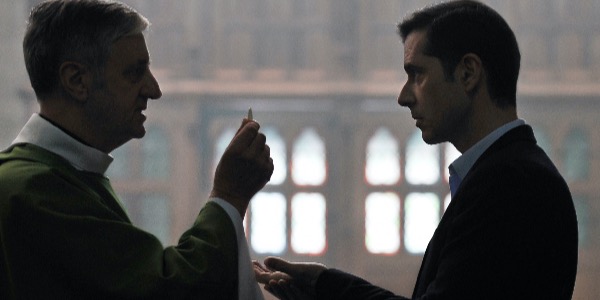François Ozon may be the most chameleonic director working today, channeling the style of a different revered filmmaker with each new release. In the past decade alone, he’s gone from Charlie Kaufman-style meta hijinks (In the House), to slow burning dramas akin to Fassbinder (Frantz), and most recently, let his hair down for an erotic thriller that would make even Brian De Palma blush (2017’s gleefully absurd Double Lover).
For his latest effort, the director is channeling a more unlikely influence: Tom McCarthy, whose earlier best picture winner Spotlight is something of a companion piece to Ozon’s latest, a harrowing indictment at the lack of action taken by the catholic church when faced with historic child sexual abuse claims.
An important, but flawed, film
Admittedly, this is something of a lazy comparison. Whereas McCarthy’s film dealt with the scandal from a distance, only giving voices to victims if they were visited by the journalist protagonists, By the Grace of God finds its power by only seeing this story through the eyes of the adults who are still struggling to cope with the abuse they faced decades earlier. It’s so prescient, that Bernard Preynat, the abusive priest portrayed in the film by Bernard Verley, even attempted to get the film blocked from release in France earlier this year – instead only starting a chain reaction that saw him get defrocked from his position in the catholic church. Ozon’s film is far from perfect, but it’s hard to deny its importance, especially when it’s helped to obtain the justice its protagonists have long been fighting for.

The story begins in 2014. Alexandre Guérin (Melvil Poupaud) has opened up to his family about the abuse he received from his priest, Father Bernard, as a child. He has still managed to keep his faith, but he’s in a moment of crisis, discovering that the church has been covering for the priest, and simply moved him to a different parish instead of removing him from a position of power even after his confessions all those years ago. After many months of correspondence, Alexandre sits with Bernard, who confesses to being a pedophile, but never offers an apology. Later, two other men who were abused by Father Bernard (François Debord, played by the ever reliable Denis Ménochet, and Emmanuel Thomassin, played by Swann Arlaud) see the coverage of this story, and start opening up about their experiences. They team together and stop at nothing to make sure the public become aware, in their campaign for justice.
By the Grace of God is undeniably powerful, but various pacing issues prevent it from fully possessing the urgency this story needs. The story is largely told as episodic character pieces, the three adult victims each separately unearthing their past traumas after reading various reports – and it becomes increasingly clear that Ozon has made the rare film based on a true story to be entirely deferential to the facts. The director met with Alexandre Guérin prior to starting work on the film, after discovering a website in which the priest’s victims all gave their various testimonies; the first hour largely takes an epistolary approach, with Poupard reading many of the real letters Alexandre sent to figures in the church, all of which the real Alexandre provided to Ozon before he commenced work on the screenplay.
A Staged Documentary
It’s a strange form of dramatisation, closer to a staged documentary than a conventional ripped from the headlines drama, and initially it makes for unshakeable viewing. But as the drama progresses, and we’re slowly introduced to the two other men facing up to past abuses, this epistolary approach proves to be far less satisfying. We spend too much time getting to know Alexandre and his history, that the other two central figures feel characterised entirely through shorthand – their traumatic pasts not explored and contextualised with the same depth.
The performances from all three leads are superb, in particular Denis Ménochet, in a surprisingly warm hearted performance that’s a departure from the often sinister figures he’s been typecast as. But Ménochet and Swann Arlaud are tasked with injecting personality into two figures who aren’t introduced until later in the drama, with back stories near identical to the man we spend the entire first hour in the company of. It’s a detriment to the structure Ozon has chosen to tell this story, and gradually robs the film of the urgency it needs.
Far more effective as a background figure is Father Bernard, portrayed by Bernard Verley as the living embodiment of the banality of evil. He feigns remorse, and acknowledges that he remembers every detail of the pain he inflicted on the men when they were younger – but doesn’t want to take any precautions to step away from his position working with children, even as he acknowledges his continued abuse. When contrasted with another major film to discuss the catholic church sex abuse scandals this year, Fernando Meirelles’ festival favourite The Two Popes, By the Grace of God only looks stronger. That film repeatedly skims over meaningful discussion in order to become a wacky buddy comedy between the two pontiffs, whereas By the Grace of God never lets the audience forget these crimes for a split second. The director keeps it simple, and focused, strictly on their impassioned plea for justice – with no additional Ozon layer.
By The Grace of God: Conclusion
By the Grace of God is flawed, but undeniable in its sheer power, and definitely needs to be regarded as more than just the “French Spotlight”.
Watch By the Grace of God
Does content like this matter to you?
Become a Member and support film journalism. Unlock access to all of Film Inquiry`s great articles. Join a community of like-minded readers who are passionate about cinema - get access to our private members Network, give back to independent filmmakers, and more.